South Foreland
It could be any old unknown dude on the cover, bearded and with his twelve string acoustic guitar pointing out at you, almost accusatorially.
But it’s not. It’s Oliver Jackson of Emily, once part of the roster on not one but two of the most fiercely independent record labels of the 1980s, Creation and Esurient. They made a masterpiece of a single, Stumble, for the latter, then a near-masterpiece of an album, Rub Al Khali (for the aptly-named Everlasting label) before fading from view.
South Foreland ranges from the Westway to the white cliffs of Dover, before finally setting its sights on America. It’s impressionistic, elliptical, and not easy to pin down, giving it the feel of a work in progress which necessarily had at some point to be surrendered to fixity. But that also gives the eight songs collected here an air of timelessness. It doesn’t hurt that they are as characteristically melodic and melancholic as Emily’s were, at times hauntingly and sorrowfully so, although I concede I might be getting at least a portion of that feeling from the great many years which have passed since I used to stand two twelve string acoustic guitar-lengths away from Ollie in the audience at Esurient’s special nights of action. There was always a blue and a blues sensibility to Ollie’s baritone, and it seems only to have become more pronounced with the passing years, even as he strains for notes higher up the register and makes you think of Bon Iver (though Justin Vernon may well never have listened to Emily, and likewise Ollie to For Emma, Forever Ago).
Synthetic keyboard washes add to the sound picture, inviting comparison to the feel and tone of Cat Power’s more recent work. There’s also a gently shuffling groove to many of the songs, and you can imagine the Emily of old performing them as they used to, dramatising and improvising away from the core of a song until it was something other than what it began life as. The same restless spirit is evident here.
It’s a welcome return, and I hope it proves not to be a one-off. Who knows, when we have live music back, it might even be possible to stand two twelve string acoustic guitar-lengths away from Ollie once again.
- Ollie Jackson – South Foreland (Bandcamp)
Beneath the branches, and the reach
 Can it really be more than thirty years ago that The Claim’s Boomy Tella LP was released? Decades have flown by, but a record I’ve consistently listened to for (considerably) more than half my life now seems to exist outside of time passing. This is the beauty of a favourite recording – its magical moments are frozen, not in aspic or ice but in some living, breathing sense, whether the overriding feeling is upbeat or downhearted. The distinctive first few beats and bars of Not So Simple Sharon Said sound out, and those intervening decades drop away. I could be nineteen again, and tapping my foot to them at The Falcon in Camden, or smiling as John Peel plays the song for the first time on the radio. Every note remains familiar to me. It’s hard to step back and attempt to appraise it afresh, let alone objectively.
Can it really be more than thirty years ago that The Claim’s Boomy Tella LP was released? Decades have flown by, but a record I’ve consistently listened to for (considerably) more than half my life now seems to exist outside of time passing. This is the beauty of a favourite recording – its magical moments are frozen, not in aspic or ice but in some living, breathing sense, whether the overriding feeling is upbeat or downhearted. The distinctive first few beats and bars of Not So Simple Sharon Said sound out, and those intervening decades drop away. I could be nineteen again, and tapping my foot to them at The Falcon in Camden, or smiling as John Peel plays the song for the first time on the radio. Every note remains familiar to me. It’s hard to step back and attempt to appraise it afresh, let alone objectively.
But this is what the reissue of Boomy Tella on A Turntable Friend Records is suggesting I should do. What David Arnold’s touchingly humble sleeve notes (‘This was nearly our great album’) tell me were ‘cheap rattling drums’ and ‘replica guitars’, still sound as thrillingly rich to these ears as they did when I first heard the LP in late 1987. And the remastering has put a little more boom into Boomy Tella, with Stuart’s sure-footed bass playing in particular coming through more clearly than I ever recall it doing on my old vinyl.
The songs are simple, yet surprisingly sophisticated. The singing is heartfelt, yet lyrically speaks so often of doubt. Uniquely, the music mixes the bloodlines of mod pop and English folk song, but much less consciously than that might suggest; while the Claim would have been entirely au fait with the Jam and the Style Council, I don’t imagine David Read had heard much if any folk music before recording Boomy Tella, and yet if you heard it a cappella, his unaffected singing voice might easily lead you to place him within the tradition of English folk song.
No matter what calibre of instruments the two Davids, Stuart and Martin were using, it’s all beautifully played, something fans came to expect of the Claim, having seen so often with our own eyes what a high-functioning, single-minded quartet they were. Here’s how Kevin Pearce, who originally put out the LP on his Esurient label, described it not long after its release, in a piece for my fanzine of the time:
I love the way it’s finely balanced. The way it’s sinewy and substantial but understated and light on its feet. The way there’s something to get your teeth into but something you can’t quite put your finger on. The way it’s so English like Ray Davies, Vic Godard but altogether strange somehow. The way I keep coming back to it like a tongue always comes back to a loose tooth. Most of all I love the way Not So Simple Sharon Says starts as much as I love the way Waterloo Sunset starts.
Boomy Tella’s cover may have been deliberately artless, but that continues to conceal an artful, inventive approach to songwriting. Guitars are picked, strummed, and struck into modernist shades of red and blue, while bass and drums form a rhythmic backbone that is indeed foot-tapping in its simplicity. Over the top David Read weaves a lyrical sense of the absurdity of the everyday into those folkish melodies of his. On one level the group are mates having a laugh, incidentally producing consummate moments of pop music like Beneath the Reach. On another, they’re gifted poets telling it like it is, playing it how they feel it, and coming up with something of the emotional heft of Down By the Chimney.
The Claim achieved a marriage of unforced exuberance and subtlety that set them apart from the majority of both the independent music of the era and the Britpop that was to follow. Where might the Claim be now if they had had the time, space and money to plot a course through the ’90s and beyond? As with so much artistic endeavour, the what-ifs are legion.
Live, the Claim were both engaging and inspiring – and having seen them play again last weekend at the 100 Club, I can report that they still are. For me, no other group of the time and type combined serious musical intent and a sense of ease and enjoyment better than the Claim did at their best. Davids Read and Arnold would introduce what were obviously carefully composed and cherished songs with carefree good humour. Odd rhythms and jazz inflections, indeed odd touches all round, informed what would otherwise have been straight-ahead pop. Dave Arnold held his guitar high against his chest, and the unconventional playing style contributed to the choppiness of the sound. Thanks to the expressive range of Dave Read’s wonderful, lilting voice, the Claim could be both irrepressibly upbeat and as blue as Miles, though cheerfulness would keep on breaking through.
The Claim tried not to let their lack of acclaim get the better of them. They kept on keeping on, playing shows to a small but devoted following, putting out great singles, but eventually, inevitably, there came a period in the early 90s when it must have felt like the returns were ever-diminishing. And so they called it a day and got on with their lives, until the time was right to regroup and – as they say in football after a defeat – go again.
The freshly remastered Boomy Tella comes with a quartet of extra songs: a Jam-my demo of the later B side, Business Boy; an equally robust rendering of God, Cliffe and Me; a fabulously lively take of live favourite Fallen Hero; and an untitled northern soul stomper that I don’t recall ever hearing. It’s all great, and my appetite is well and truly whetted for the group’s new material, especially having heard a handful of the new songs live. It’s due to appear in album form come May. The title? The New Industrial Ballads. The expectation is that they will be at the very least on a par with the old industrial ballads of Boomy Tella.
45 45s #31 The Claim – Sunday (Esurient, 1991)
 A bedsit in Holloway, circa 1991. Dave Arnold, guitarist from Kentish four piece the Claim, has made the journey into London from his village bordering the Thames estuary to talk to me. He wants to ask me about something; I can’t imagine what. Once he has cuppa in hand, he springs it on me. ‘We’d like you to be our manager, Dan.’
A bedsit in Holloway, circa 1991. Dave Arnold, guitarist from Kentish four piece the Claim, has made the journey into London from his village bordering the Thames estuary to talk to me. He wants to ask me about something; I can’t imagine what. Once he has cuppa in hand, he springs it on me. ‘We’d like you to be our manager, Dan.’
‘Blimey,’ I probably said in reply, and then almost certainly began to um and ah. I’m not sure what’s prompted it, other than my loyal support, writing about the group and turning up to most if not all of their London shows; that and the thankless task of representing themselves, perhaps. They could not have asked a less Svengali-like figure. I was unemployed, depressed, prone to tension headaches, and introverted to the point that even making a phone call to a friend held a degree of challenge for me.
So like a eejit, I turned Dave and the group down. With responsibility for their success in my hands, perhaps I would have pushed myself, and more through dedication than guile, managed to forward their cause a little. Grown with the role. But at that stage of my life, I feared it would be too much for me, and that I would have to resign as soon as it got like that, or find myself sacked when they saw I wasn’t coping. And then there was my own dream – of writing, literary greatness even – which I believed at all costs I ought to be pursuing.
But I always felt honoured to have been asked, and if I had my time again, I like to think I would say yes, and worry about the worries and time for writing later. Say yes to everything, kids, that’s my advice. If it doesn’t work out, it doesn’t work out. Don’t be afraid of failure. And if you are thinking of being a writer, live some life before you sit down to write. That’s as important as finding the time to practice the art of it.
I still love the Claim’s music. It’s simple, yet surprisingly sophisticated. It’s heartfelt, yet lyrically speaks so often of doubt. It mixes the bloodlines of the Jam and English folk song long before Paul Weller thought to himself, and much less consciously than that might suggest. You should all buy a copy of the retrospective compilation, Black path. I can say that without declaring an interest, because not having become their manager, I’m not on a cut or anything.
Initially when it came to picking a 45 of theirs, I was going to go with ‘Birth of a teenager’ – which I could with a degree of right claim as my own because scratched between the run-off grooves of its delightfully funny spoken word B side ‘Mike the bike’ (featuring Vic Templar) is ‘FOR DAN PANTRY’ – but to be honest I much prefer this song, a kitchen sink fantasia and homage to the dubious joys of the day of rest. It shares the same bleak Goffin & King vision as the Monkees’ ‘Pleasant Valley Sunday’, only with an enhanced sense of melancholy which no doubt results from the dismal nature of enduring Sundays in Britain in the 1980s. Lyrically Dave Read ventures beyond the view from the kitchen sink to daydream Walter Mittyishly as to what he’d answer if he were interviewed by the Sunday supplement he is thumbing through, a conceit that’s doubly rich for being handled straight within the context of the song, but also telling in terms of the Claim’s own inability to grow an audience to and beyond the point where he might have expected to be interviewed on a regular basis. Instead, he is the captive big cat featured on Alistair’s cover, caged and prowling, dreaming of the Serengeti.
Melodically it’s perfect, so that if Dave Read had merely hummed his way through the song, you would still experience the same emotion of feeling ensnared within a suburban dream while real life happens elsewhere. It’s also beautifully played by the group, something fans came to expect of the Claim, having seen so often with our own eyes what a high-functioning, single-minded quartet they were.
Having chosen consciously or otherwise to operate somewhat outside of the times, the Claim never did garner the audience they deserved. Perhaps they might have, had they had been as hip to the sounds of now as Damon Albarn’s Blur were, but since the Claim possessed more insouciance than swagger, it wasn’t to be.
45 45s #28 Emily – Stumble (Esurient, 1989)
 Let’s just pause right there, and linger over that word – esurient, meaning greedy or voracious. 17th century in origin, derived from the Latin esurire, and meaning to be hungry. What a beautiful word, and what a great name for a record label.
Let’s just pause right there, and linger over that word – esurient, meaning greedy or voracious. 17th century in origin, derived from the Latin esurire, and meaning to be hungry. What a beautiful word, and what a great name for a record label.
Esurient was run by Kevin Pearce, whose previous activities included the sharp, exceedingly literate fanzines Hungrybeat and The same sky. His view of pop music and any particular artist’s position in or outside its pantheon was, it is fair to say, uncompromising. To quote his own slogan, Kevin was ‘Esurient for change’. In my own fanzine of the time, writing about ‘Stumble’, I was unable to stop myself employing the phrase ‘the parturient Esurient’. Yes, for better or worse, we had both swallowed dictionaries in our youth.
I played this single so much – Oliver Jackson’s baritone booming out at all hours – that the Jamaican guy in the bedsit next door asked me if I was into opera.
Nearly every time Emily or label mates the Claim and the Hellfire Sermons played, I went along to see them. For the last Esurient event that I attended before leaving for a long sojourn in France, Kevin had managed to track down a copy of ‘Au revoir Daniel’ by Mireille Mathieu, and played it between the acts that night. It was that kind of gesture, that attention to detail which made Esurient special (and in those days to source a song wasn’t anything like as easy as typing in ‘Au revoir Daniel’ into YouTube either).
In 2008 I wrote in rather long-winded fashion about ‘Stumble’ and its B sides, ‘Boxing Day blues’ and ‘Rachel’. I quoted myself there from a 1998 piece on the Hellfire Sermons for Tangents: ‘‘Stumble’ is one of the best singles ever, and ‘Merry-go-round’, the greatest single never released.’ In 2003, 14 years after its release, Leonard Roberge of the Washington City Paper said that ‘Stumble’ was ‘Astral weeks in four minutes instead of 47’. The song has travelled and stayed with me and a few others through time. I have imagined putting together a compilation consisting of different takes of ‘Stumble’ – from the initial demo to the innumerable versions captured and recorded live, which ranged from acoustic with congas to ferocious four piece savagings. I’ve heard the song in my dreams. Dammit, I’ve even played it in my dreams; and in waking hours, I don’t play the guitar.
At this distance I can hear the odd flaw – occasionally straining for effect, Ollie shows himself to be the young, relatively inexperienced singer that he was, while the emotional psychodrama of the lyric leaves it somewhat ambiguous as to who is doing and who is being done to (is the wail of ‘Let me see you’ the plaint of the spurning or the spurned lover – a surprise ending or effectively reported speech?) but nevertheless, were I to be foolish enough to make such a shortlist, ‘Stumble’ would be right up there in the top five of this selection of 45 45s, and I still believe it deserves to be far better known than it is.
- Emily – Stumble (YouTube)
- Emily – Stumble (mp3)
The world will stop and spin ten times faster
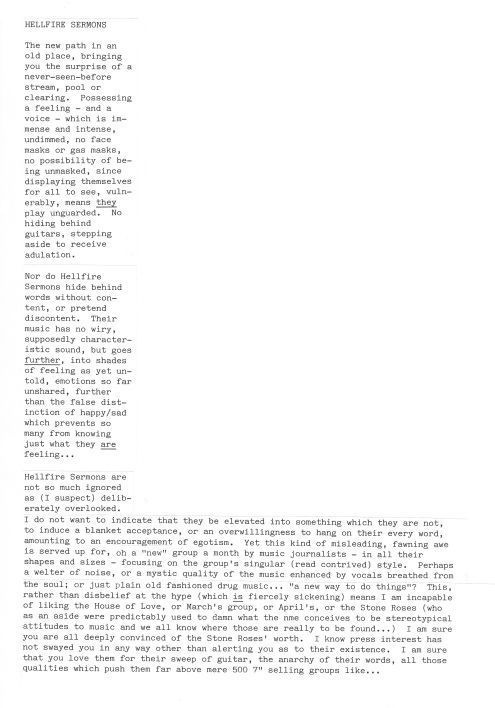
A piece about the Hellfire Sermons, which became the starting point of an article for Tangents, which itself was reworked as sleeve notes for Hymns: ancient and modern, the collection of singles and unreleased recordings issued by Bus Stop in 2002. It’s a great shame that the Hellfires never recorded an LP either for Esurient or Dishy – but at least Hymns helps fill that absence.
‘Not nailed down’ was the 1990 highpoint of their first phase as a fantastically melodic and incisive guitar pop group. And in ‘Covered in love’ you hear the precise moment at which singer Colin Pennington apparently comes unhinged, with the group following suit. It’s a thrilling record, crazed and dangerous but deliciously catchy. They even managed to pull off the same trick with their next single for Dishy, ‘Sarasine’, which was equally blood-curdling. In their guise as supreme melodists, they were another fab group from Liverpool to set alongside the Teardrop Explodes, Shack and the La’s. And as scary dramatists, they out-Pixied the Pixies.
- Hellfire Sermons – Not nailed down
- Hellfire Sermons – Covered in love
- Hellfire Sermons MySpace
- Hellfire Sermons website
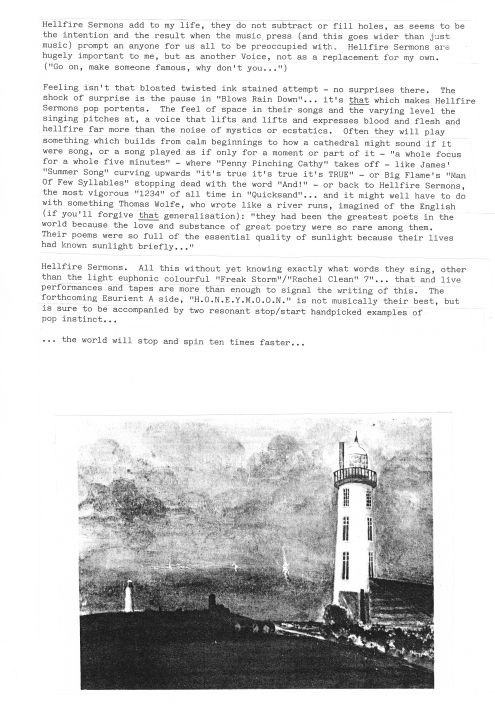
Loser’s corner
28th September 2009. Set your faces to stunned and make a note of the date in your diaries, for that’s the day on which the Claim finally make it onto CD with the release of Black path: retrospective 1985-1992. Who’d have thought that in 2009 they would be releasing a record within eight days of the Clientele, whose Bonfires of the heath is out on 6th October; another astonishing preview track (‘Harvest time’) is available here. (I first hitched the two groups together for this 2001 piece for Tangents.)
To celebrate, here – courtesy of the Right Honorable Vic Templar – is a link to a YouTube outing of one of the previously unreleased songs on the retrospective, the not entirely typical ‘Between heaven and Woolworths’.
And here are the pages from Pantry For The World which celebrated the Claim’s Boomy Tella (‘the best LP of 1988’) and their subsequent singles for Esurient. The quote about the Claim live came from a letter written by one Richey Edwards, whose group had just made their London debut supporting the Claim.
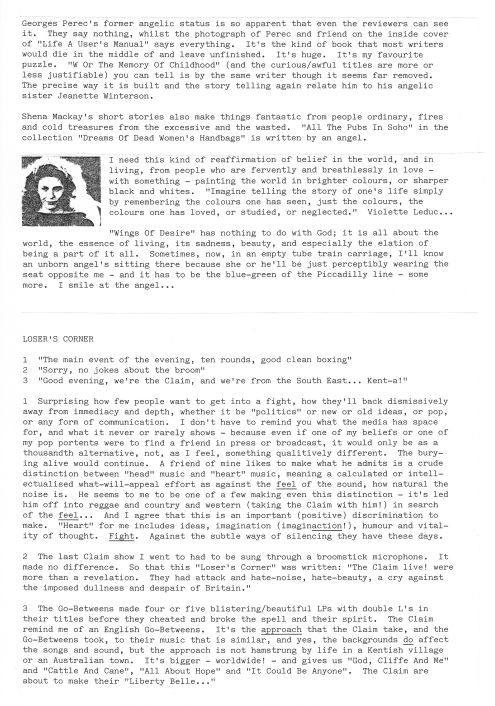
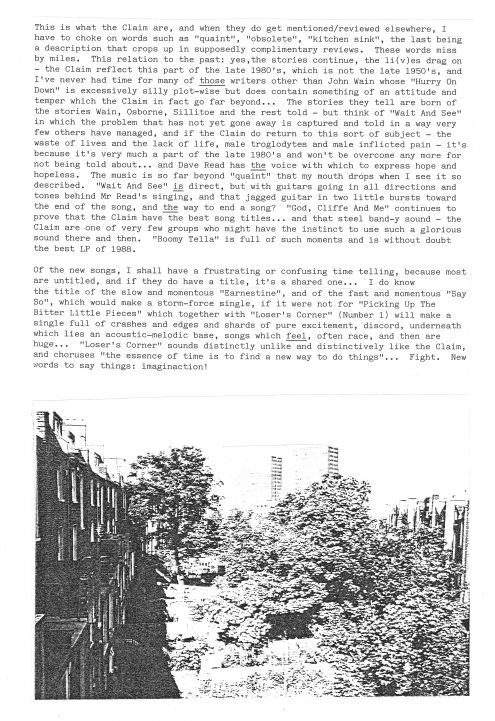
Here also is one half of the Pantry For The World supplement, featuring a piece about the Claim by Kevin Pearce, who wrote about them with the appreciation and bias appropriate to the man who was releasing their records.
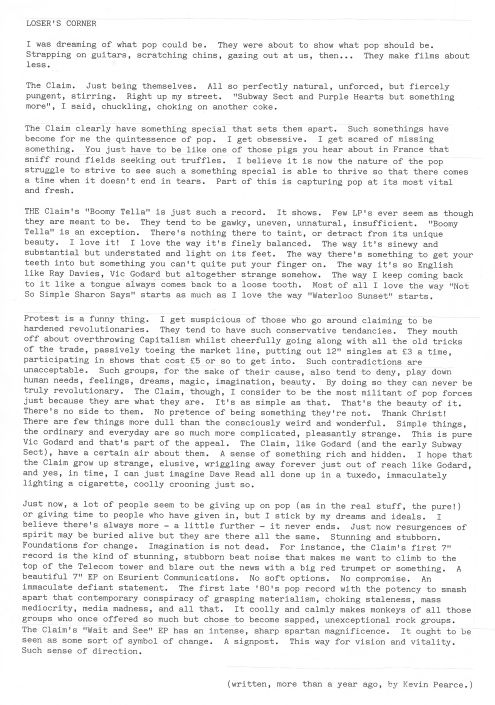
Black path tracklisting:
Picking up the bitter little pieces
Birth Of A Teenager
Plastic Grip
Say So
Mike The Bike (Featuring Vic Templar)
Sunday
Being A Minor
Between Heaven And Woolworths (For Brian Patten)
Gullible’s travels
Not So Simple Sharon Says
Christopher
God, Cliffe And Me
Ernestine
Sporting Life
Dear
Mrs Shepherd
Treasurehunting
Do You Still Feel?
Down By The Chimney
Lonely Tarts
Love Letter
Wait And See
Mary Stavin
Seen And Done It All
Loser’s Corner
That’s one half of Boomy Tella by my reckoning, and sadly means no room for the trombone-fuelled knees-up of ‘Beneath the reach’ or ‘All about hope’, on which the Claim were at their most exquisitely pastoral. Fingers crossed Boomy will before long get a release in its own right. Neither ‘This pencil…’ nor ‘Another yesterday’ feature – they can be downloaded here.
There is also at least one live date confirmed at the Royal Function Rooms in Rochester on Saturday 19th September with the possibility of a London appearance.
- The Claim (MySpace)
Picking up the bitter little pieces
Well done to Vic who is trying hard to get some wind behind an unlikely Claim revival here and here. Vic was if I’m not mistaken the writer and narrator of ‘Mike the bike’, the B side of the group’s ‘Birth of a teenager’ single for Bob Stanley’s Caff label.
It will be a joyous day indeed when the Bus Stop compilation – originally scheduled for release in 2002! – finally sees the light of day. Meantime there is a Claim website streaming a few of their songs, and efforts have been made on YouTube which allow you the pleasure not just of ‘Sunday’, ‘Sporting life’ and ‘Birth of a teenager’, but also of seeing the Two Daves (Read and Arnold) performing ‘Picking up the bitter little pieces’ as recently as July last year.
Let me see you
Alistair has been posting live recordings of the triumvirate of groups who recorded for Kevin Pearce’s Esurient label, along with the handbills produced to advertise the shows. In the absence of the half-dozen long-players that collectively the trio should have gone on to make, these sets formed part of my staple listening for many years. Subsequently whenever I’ve dug them out of the Pantry vaults, they have had the power to remind me of what I believed then – that on their night each was the best band on the planet. The tapes may now have become a myriad of bits compacted into a file, but they have lost none of their wow and flutter. Though very different from each other, what all three groups had in common was the ambition of their song-writing and the attacking edge with which they performed; the same edge and attack that led to the creation of their record label. You knew in your heart that group and audience were the outermost of outcasts, hanging by a finger from the bottom rung of a ladder each were ambivalent about climbing, but these upstairs rooms above pubs – whether Horse and Groom or King and Queen – were the pitch for some of the most intense musical experiences of my life. So intense that that for sanity’s sake I had to take a break from attending the Esurient shows. Not being there was of course worse than the frustration I felt in the ineluctable sense when I watched them that these groups were never going to be allowed to rise above the level they had attained in finding someone who had enough belief in their greatness to stage their shows and put out their records.
They were joyful nights by and large but at its most intense, and when you are at your most susceptible to its intensity, there is as much pain as pleasure in music. That’s what I still hear when I listen to either of the live versions of Emily’s ‘Stumble’ that Alistair has made available to a world which, I suspect, will be about as interested as it was near on twenty years ago. But you’ll be pleased to hear I’m over it now. Honest.
